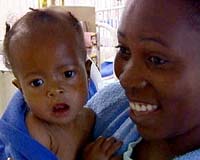| . |  |
. |
Kiev (AFP) Nov 10, 2009 Ukraine's epidemic of flu and acute respiratory disorders has now affected more than a million people, the country's deputy health minister said on Tuesday. Vasyl Lazoryshynets said the death toll from the epidemic had risen to 174, as President Viktor Yushchenko warned the country must brace itself for a second wave of infections. Nearly 53,000 Ukrainians have now been hospitalised, Lazoryshynets said, but the number in intensive care has fallen by nearly a quarter to around 330. A total of 67 cases of swine flu have been reported in Ukraine, he said, 14 of which had been fatal. "Ukraine must prepare properly for a second wave of respiratory infections and flu," including A(H1N1), Yushchenko said Tuesday, according to the Interfax news agency. A World Health Organisation (WHO) team in Ukraine said on Monday the epidemic had slowed, but warned a second wave was likely. On Monday the health ministry's previous bulletin on the epidemic, which began in mid-October, reported 969,000 infections, with 155 deaths and 65 cases of A(H1N1).
earlier related report The A(H1N1) virus "is causing an emergency for workers and families across the country," Senator Chris Dodd told a Senate subcommittee hearing on paid sick leave in a time of pandemic flu. The United States is the only developed nation without a national policy on paid sick leave, Dodd said. Most government workers, including US legislators, have paid sick leave, but since it is not mandatory some 57 million US private sector workers, including many in low-paid jobs and tens of thousands working in school systems, lack the benefit. For them, contracting the swine flu "means you have a choice: either go into work sick and risk infecting your co-workers or stay home and lose a day's pay," Dodd said. The senator has introduced legislation to give US workers paid sick days if they or a family member come down with swine flu. As the nation struggles to emerge from a punishing recession and double-digit unemployment, many Americans cannot consider taking unpaid sick leave, said Dodd. "We're in the company -- and I say this respectfully of these countries -- of Lesotho, Liberia, Papua-New Guinea and Swaziland. Those countries and the United States are the five that don't have paid sick leave," Dodd said. "Five nations, four of whom are struggling economies, barely surviving as nation-states, and the richest country in the world," he told a hearing in the Senate health, education, labor and pensions subcommittee. A person who goes into work when they have swine flu will infect 10 percent of their co-workers, according to data from the Centers for Disease Control and Prevention (CDC), which has repeatedly urged people to stay at home if they fall ill with flu-like symptoms. "If paid sick leave had been a reality when this pandemic began, we would be in better shape," Dodd said. The A(H1N1) flu has infected as many as 5.7 million people in 48 US states and claimed 672 lives, including at least 129 children, according to CDC data. Share This Article With Planet Earth
Related Links Epidemics on Earth - Bird Flu, HIV/AIDS, Ebola
 S.Africa's death rate doubled in a decade: health minister
S.Africa's death rate doubled in a decade: health ministerJohannesburg (AFP) Nov 10, 2009 South Africa's death rate doubled over the last decade due to the spread of AIDS, the health minister said Tuesday, blaming the crisis on government policies under former president Thabo Mbeki. "In 11 years -- from 1997 to 2008 -- the rate of death has doubled in South Africa. That is obviously something that cannot but worry a person," Health Minister Aaron Motsoaledi told reporters at ... read more |
|
| The content herein, unless otherwise known to be public domain, are Copyright 1995-2009 - SpaceDaily. AFP and UPI Wire Stories are copyright Agence France-Presse and United Press International. ESA Portal Reports are copyright European Space Agency. All NASA sourced material is public domain. Additional copyrights may apply in whole or part to other bona fide parties. Advertising does not imply endorsement,agreement or approval of any opinions, statements or information provided by SpaceDaily on any Web page published or hosted by SpaceDaily. Privacy Statement |